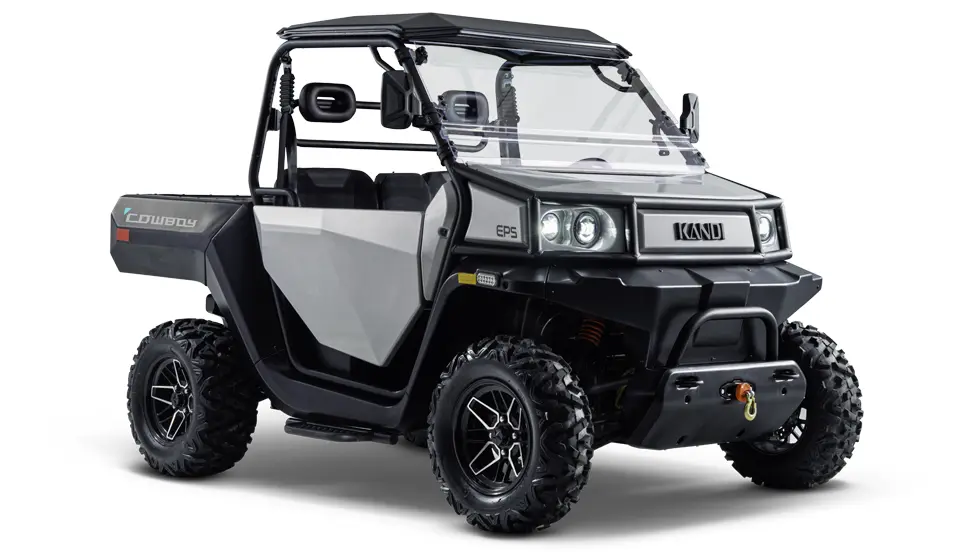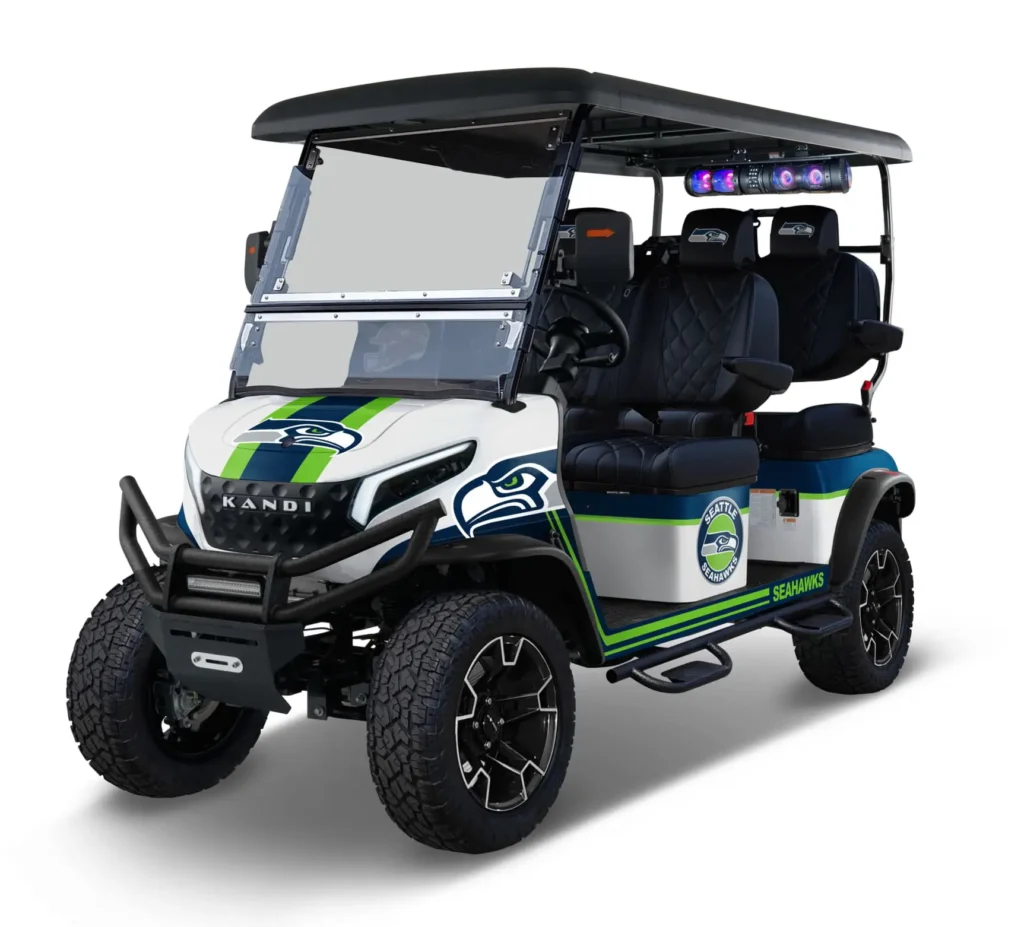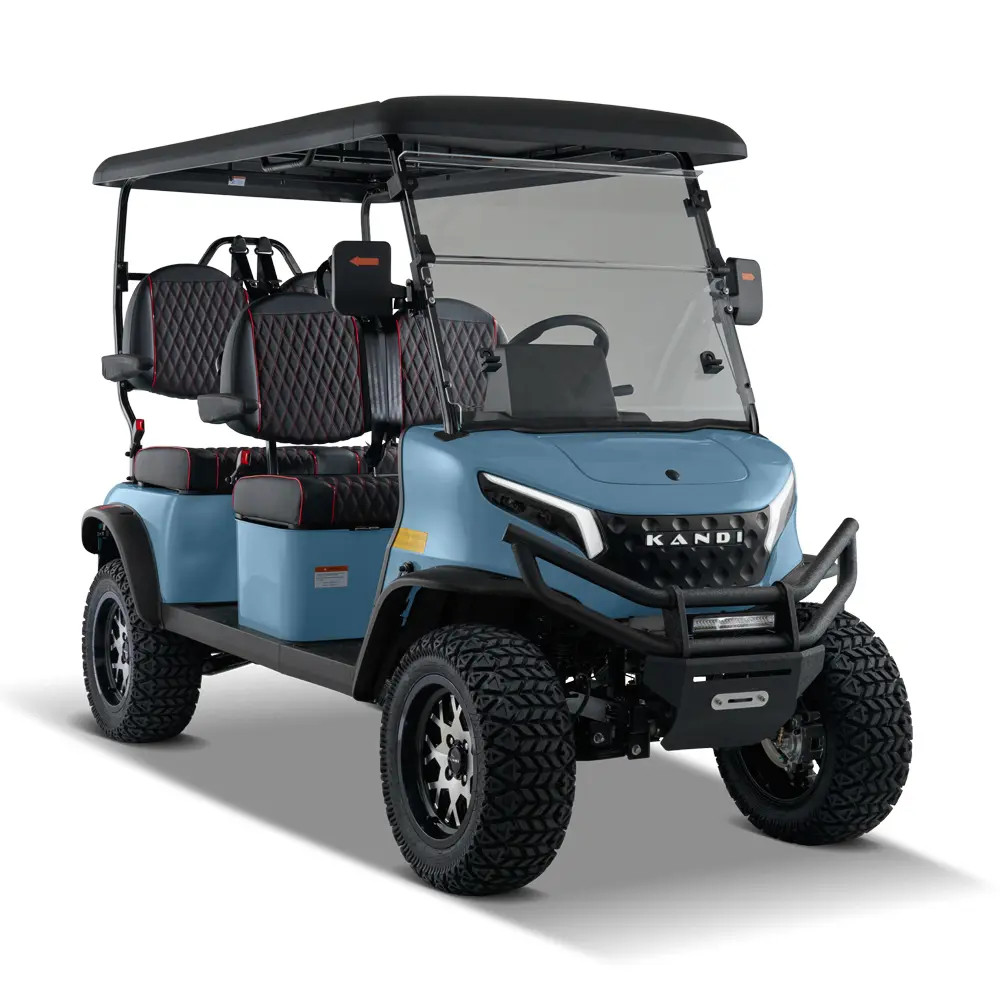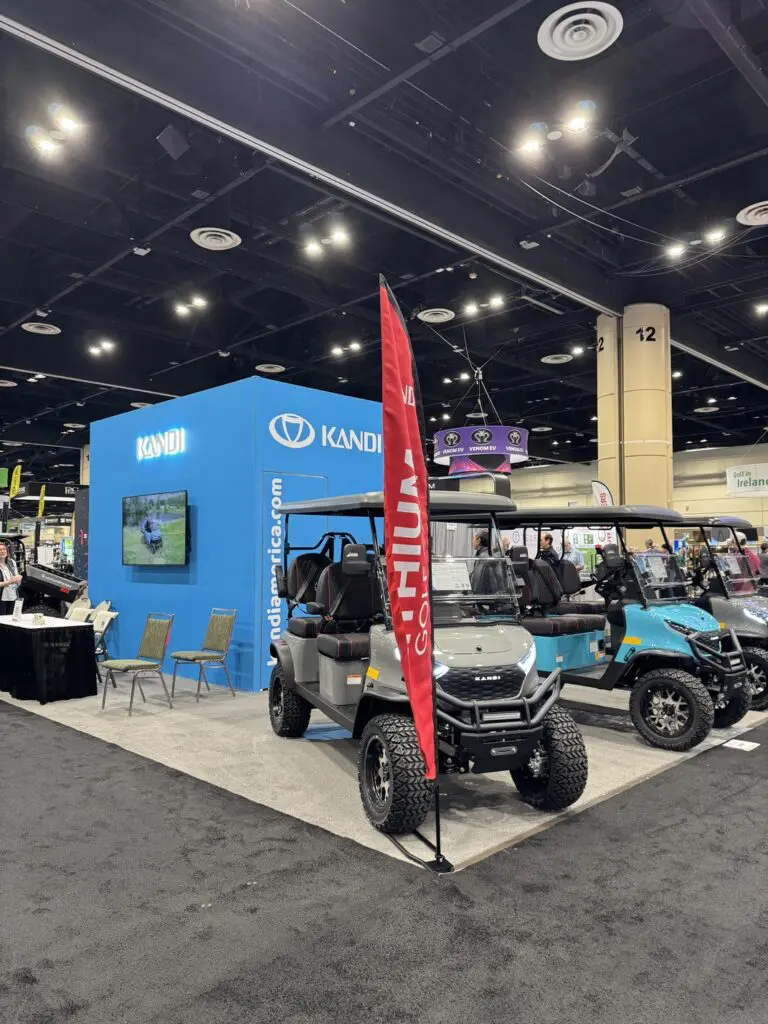Golf carts have evolved from their traditional role to become a popular mode of transportation beyond the greens. This shift has been driven by the practicality and convenience they offer for short-distance travel, making them a favored choice in gated communities, resorts, and for running errands in urban settings.
The compact size, lower operating costs compared to conventional vehicles, and the environmental benefits of electric models have contributed to their rising popularity.
That brings us to the question – ‘Are golf carts street legal in California?’. Let’s find out.
Kandi America is a leading provider of street-legal golf carts and electric vehicles in California, catering to the growing demand for sustainable and convenient transportation solutions. The company offers a range of electric vehicles designed to meet the legal requirements for street use in California, combining innovation with functionality. Kandi America’s offerings stand out for their eco-friendliness, cutting-edge technology, and adherence to safety and legal standards, making them an attractive option for Californians looking to embrace the golf cart lifestyle beyond the course.
Navigating California Golf Cart Laws
It’s important to understand the distinction between golf carts and low-speed vehicles (LSVs) due to the different designations and regulations that apply to each in California.
What Qualifies as a Golf Cart Under California Law?
Golf carts in California are typically designed for transporting golfers and their equipment around golf courses. They have a maximum speed of 15 mph and are designed to carry 2 to 4 people. These carts can operate without registration on golf courses or private property and in designated communities. They are not allowed, however, on roads with speed limits exceeding 25 mph.
When a golf cart is used within one mile of a golf course or on roads designated by local jurisdictions, it does not require registration.
Distinction Between Golf Carts and LSVs
LSVs are designed for broader use on public streets, roads, and highways within specific limits. They can reach speeds over 20 mph, up to a maximum of 25 mph, and are equipped with a 17-digit vehicle identification number (VIN). Unlike golf carts, LSVs must be registered and the operator must have a valid California driver’s license and insurance. He or she must also adhere to safety standards that include headlights, brake lights, turn signals, and rear-view mirrors.
LSVs in California cannot operate on roads with a speed limit of over 35 mph and are subject to Federal Motor Vehicle Safety Standards (FMVSS).
Key Regulations
Navigating the regulations surrounding golf carts is crucial to their safe and legal operation on public roads.
- Golf Carts: State and local regulations focused on safety equipment and usage areas apply to golf carts in California that don’t exceed speeds of 20 mph. These vehicles are often limited to designated communities or areas close to golf courses.
- LSVs: Vehicles that exceed 20 mph but cannot go beyond 25 mph are classified as LSVs and require adherence to federal law, including the need for a valid driver’s license, registration, and insurance. These vehicles are equipped with standard motor vehicle safety features and are allowed on roadways with a speed limit of 35 mph or less.
Age Requirements: How Old Do You Have to Be to Drive a Golf Cart in California?
California’s age and licensing requirements for driving a golf cart are aligned with the state’s overall road safety regulations.
Age Requirements for Driving a Golf Cart in California
To drive a golf cart in California, an individual must be at least 16. The age requirement is to ensure drivers have sufficient maturity and judgment for safe vehicle operation.
Required Permits or Licenses
All golf cart drivers on public roads must have a valid driver’s license. This applies to both golf carts and LSVs, making sure operators are familiar with road rules and competent in driving. Learner’s permit holders can operate a golf cart if accompanied by a licensed driver aged 25 or older.
Exploring Street-Legal Golf Carts in California
To be deemed street-legal golf, carts in California must be equipped with safety features that comply with state regulations for vehicle operation on public roads.
Required Equipment and Features
The key features that make a golf cart street-legal in California include:
- Seat Belts: To ensure the safety of all passengers in the event of a collision or sudden stop.
- Lights: A full set of lighting equipment is necessary for visibility. This includes headlights for night-time visibility, taillights, and brake lights to indicate when the vehicle is slowing or stopping, turn signals to indicate turns, and reflectors to make the vehicle visible from multiple angles in low-light conditions.
- Windshield and Wipers: Essential for the driver’s visibility during adverse weather conditions.
- Parking Brake: To secure the vehicle when unused and prevent unintentional movement.
Kandi America’s Electric Golf Models
Kandi America offers electric golf carts that meet California’s street-legal requirements. Our models come with the necessary safety features and are designed for eco-friendly operation. These electric golf carts provide a sustainable option for short-distance travel on public roads, combining safety and environmental consciousness.
Staying Safe and Compliant: California Golf Cart Laws
California enforces specific laws for golf carts and LSVs on public roads to ensure safety.
- Required Equipment: Golf carts and LSVs must have proper lighting to ensure visibility.
- Regulated Speed: Abiding by speed limits is critical to prevent accidents, given the limited speed capability of these vehicles.
- Driving Restrictions: Driving under the influence of alcohol or other banned substances is illegal as it increases the risk of accidents.
- Maintenance: Regular checks and maintenance of brakes, steering, and lights are crucial to avoid mechanical failures.
- Awareness: Understanding vehicle capabilities and traffic navigation is crucial for safe operation.
Low-Speed Vehicle Regulations in California
California’s regulations for LSVs differentiate them from golf carts based on speed, safety features, and road usage permissions. To recapitulate, LSVs must have a 17-digit VIN, adhere to FMVSS, and be equipped with headlights, taillights, mirrors, and seat belts. They are permitted on roads where the speed limit does not exceed 35 mph.
Here are the regulations for low-speed vehicles in California:
- Speed Limitation: LSVs cannot exceed 25 mph and are only allowed on roads with speed limits of 35 mph or less.
- Safety Requirements: Mandatory features include headlights, rear-view mirrors, turn signals, seat belts, and reflectors to align with motor vehicle safety standards.
- Driver Licensing: Operators must have a valid California driver’s license.
- Registration and Insurance: LSVs require DMV registration and insurance coverage.
- Operational Restrictions: Usage is prohibited on sidewalks, bike paths, and roads with speed limits over 35 mph.
Advantages of Choosing Kandi America’s Electric Golf Carts
Kandi America’s electric golf carts are recognized for their compliance with California’s legal standards and feature safety equipment that meets state regulations. Their eco-friendly design is complemented by Lithium Iron Phosphate batteries that offer longer battery life and faster charging times.
The Kruiser series, including models like the Kruiser 2P, 4P, and 6P, showcases stylish design and customizable options. These carts deliver robust performance through powerful motors, while electronic power steering in certain models enhances maneuverability. Kandi America emphasizes customer satisfaction with high-quality, durable products for various transportation needs, from leisurely rides to cargo transport.
Recap: Embracing the Golf Cart Lifestyle in California
Understanding the legal framework for golf carts and LSVs in California is essential for compliant and safe navigation on public roads. ‘Are golf carts street legal in California?’ – This question is vital as golf carts, limited to speeds of up to 15 mph and primarily used within golf courses and their proximity, typically do not need registration in such settings or designated communities.
Conversely, LSVs, capable of exceeding speeds of 20 mph up to a maximum of 25 mph, require registration. Operators of LSVs must possess a valid California driver’s license and adhere to safety regulations, including installing headlights, seat belts, and mirrors, to ensure safe and legal operation on public roads.
Kandi America responds to these legal requirements by offering a range of street-legal golf carts and electric vehicles that embody eco-friendliness, innovation, and compliance with safety standards. Our Kruiser series of vehicles are tailored to meet California’s stringent regulations, offering solutions for those looking to adopt a golf cart lifestyle beyond the course.
Kandi America brings you a wide range of electric vehicles that adhere to regulatory standards. Contact us today for detailed information on models, features, and compliance specifics.



